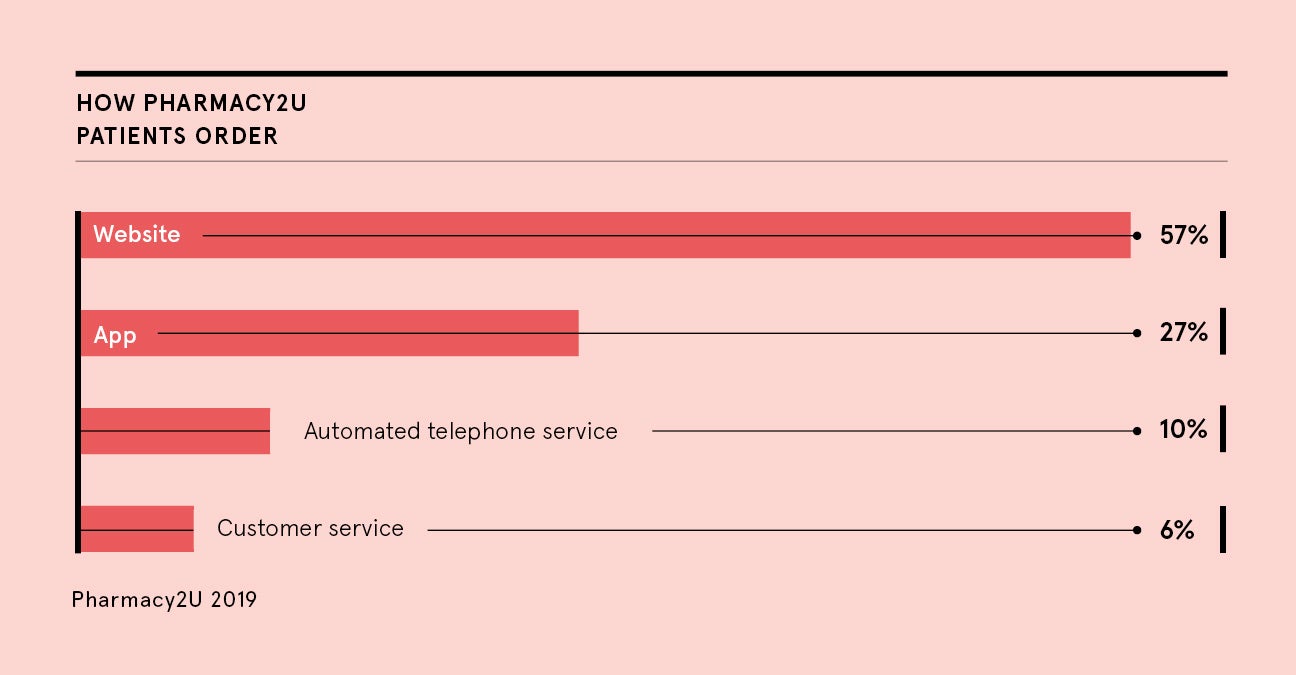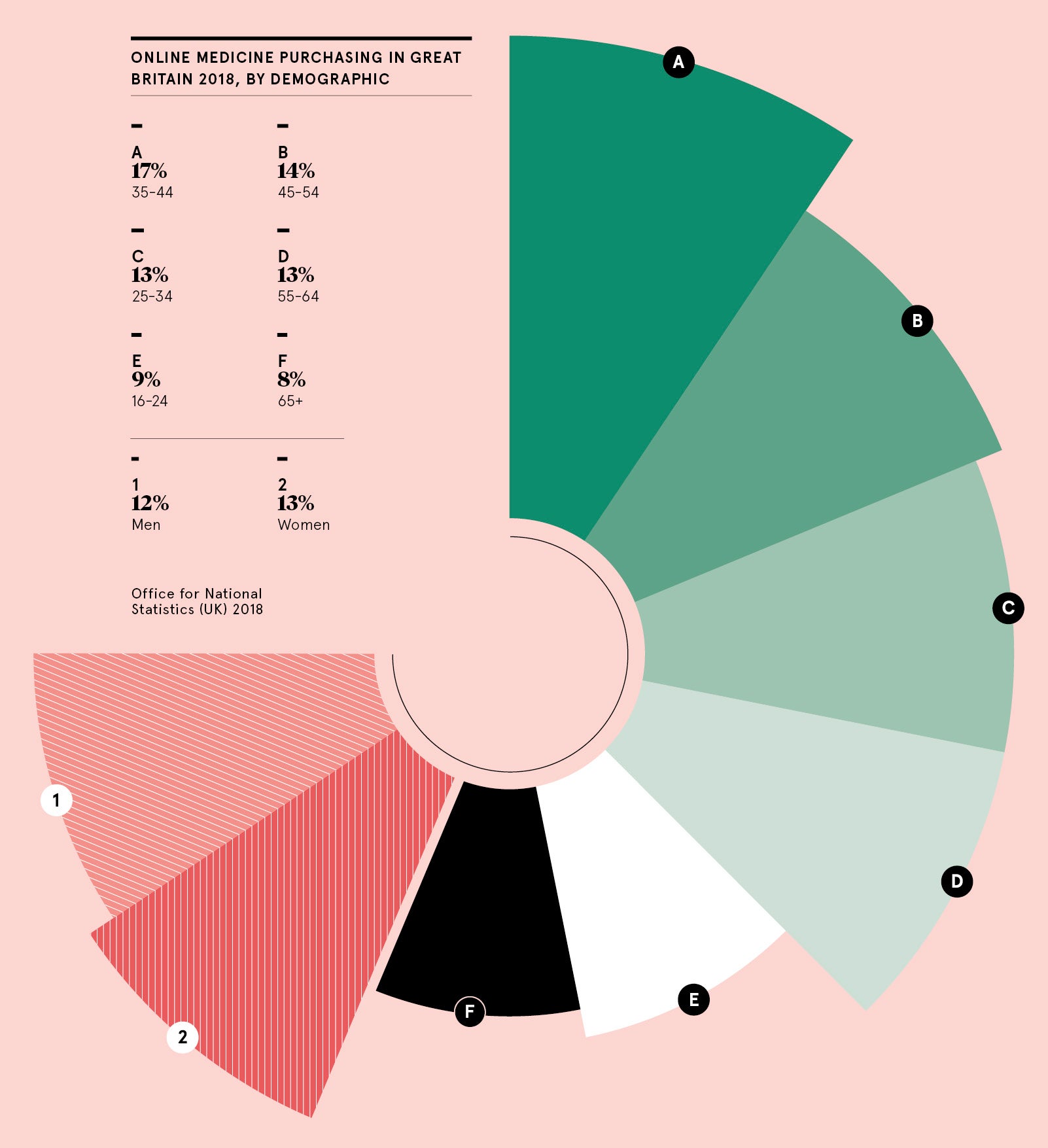“Imagine a community pharmacy with a core business that’s not about dispensing pills.” It’s a bold, visionary statement, but Mark Livingstone is used to shaking standard industries into progressive business models.
The approach has cast him as the “Great Disruptor” of the world of pharmacy, an industry at the sharp end of healthcare but, arguably, little changed since the 18th century when chemists first became features of the high street, characterised by a venerable status.
Mr Livingstone, whose background includes successful market-changing entries in home film and healthy snacks with LOVEFiLM and Graze, is chief executive of Pharmacy2U, the NHS contracted online repeat prescriptions medicines service that sends out an item of medication every two seconds of operation.
The company is reshaping medicine delivery, making it easier and quicker for patients to manage their repeat prescriptions with free deliveries to their door that bypass the need to visit a high street pharmacy.
The system has had rapid adoption and gathered more than 300,000 patients. This community is growing by the day and, within 18 months, its distribution levels will accelerate to one item a second as an operation driven by robotics, automation and data analytics expands to challenge established notions of GP prescriptions and chemists.
What we are doing is as tectonic as the banking revolution
“This industry hasn’t changed much since 1734, but there are huge gains to be made in terms of speed, efficiency and safety at a critical time in the UK’s health journey,” says Mr Livingstone. “Pharmacy2U is a new force in the market and we are here to stay because we are making a difference.”
That difference resonates not just in a smart, online service that appeals to the time-challenged digitally savvy, but also to the huge sector of the population who are unwell or have disabilities and struggle with the logistics of visiting a doctor’s surgery and then the pharmacy to collect prescriptions.
“My ambition for bricks and mortar community pharmacy is far less about dispensing pills and far more about dispensing services. People will challenge that and say ‘what about acute medication for people who need pills now?’ But if you look at the online takeaway business, it is not beyond the wit of man to offer an immediate service to your door,” says Mr Livingstone.
“It would be possible, particularly in metropolitan areas, while retaining bricks-and-mortar pharmacies in rural areas where a different model of service is needed.
“This amounts to large-scale change and some people are cautious, but if you think of banks 20 or 30 years ago, almost all they did was dispense cash. Today they rarely dispense cash because we have a card economy and people go to banks for services not cash. I think that paradigm could be applied to community pharmacy.
“I don’t underestimate the power of habitual behaviour; if you do something for a long time then you accept it as the way of doing things. The public was initially scared of using cashpoints when they were first launched, but they have revolutionised banking. What we are doing is as tectonic as the
banking revolution.”
Pharmacy2U is a new force in the market and we are here to stay because we are making a difference
The compelling forces in play are an ageing demographic – by 2036 at least half of local authorities are projected to have 25 per cent or more of their local population aged over 65 – with more co-morbidities that demand multiple medications, financial constraints within healthcare along with the NHS’s Electronic Prescription Services (EPS), which links around 93 per cent of GP surgeries to pharmacies, making online ordering easy and efficient; green scripts ferried by patients will soon become collectors’ items.
The perfect-storm category is formed by a further key element: high street pharmacists are remunerated by their dispensing levels, which can anchor highly trained and committed clinicians to huge periods of the physical task of picking, packing and checking pills.
Across the health spectrum, from health secretary Matt Hancock through specialists and top health advisers to frontline services, the push is towards measures that prevent illness. Yet pharmacists, a potent force for change, remain stuck in their dispensing rooms with limited time to engage the public to shift behaviours.
“We are a force for good because we can liberate pharmacists so they can spend more time with the public and play a full role in helping the nation’s healthcare,” adds Mr Livingstone, who created the company after buying into the online retailer Chemist Direct and merging it with Pharmacy2U, which is one of the early-adopters of EPS.

His background as chief executive of digital subscription service LOVEFiLM, and a founding investor and board member of Graze, the online health snacks service, underpins Mr Livingstone’s strategy for Pharmacy2U, while also giving a fresh vision across an industry straitjacketed by tradition and the government’s contract with the UK’s 12,000 pharmacies.
He has raised and invested over £100 million in the business, which includes more than tripling dispensary capacity over the next 18 months, and has a target for the business to reach £1-billion annual revenue in five years.
“This is a long-term play. We will be a permanent fixture on the healthcare landscape,” he says. “We have gone from being a nascent business and it is now pure logic that we will be 10 to 15 per cent of the market. There is a place for bricks-and-mortar pharmacies, but distance dispensing is here to stay.
“We are on a ten-year journey and we are two years into it. At the same time, the thematic of healthcare globally in the next decade or two is pivoting to health outcomes. Not how much you dispense or how much the drug costs, but about pharmaceutical companies being remunerated on how well people react to their treatment. Similarly, community pharmacies will be rewarded not by dispensing volumes, but by how well they deliver services and triage people away from GP surgeries and hospitals.”
Online delivery across the £11-billion total NHS prescribing budgets will inevitably take business away from pharmacies and the prospect of closures is a concern from both the public and pharmacy owners, who range from small independents with one or two branches, through medium-sized companies to huge national chains boasting 500-plus branches.
“There is an accent on monetising footfall when a pharmacy should feel close to a GP surgery, not a shop. They should be able to do what they are brilliant at, such as using their clinical skills, while we do what we are brilliant at, so we can create a more comprehensive proposition for the patient,” says Mr Livingstone.
“Go forward five years and we can move away from volume remuneration and have great community pharmacists serving their community with much better results.
“We have highly trained medical specialists spending parts of their days dispensing pills when they could be freed up to spend more time influencing patient health and playing a vital role in turning round a nation’s health prospects.”
We are a force for good because we can liberate pharmacists so they can spend more time with the public and play a full role in helping the nation’s healthcare
The huge hurdle on the route to a promised land is the contract between the Department of Health and the NHS contracted pharmacies, which are represented by the Pharmaceutical Services Negotiating Committee (PSNC).
The PSNC, which sets down levels of government funding and pricing, has been battling against government cuts and recently produced a strategy document that states: “If patient needs and NHS ambitions for pharmacy indicate that a reduction in the number of pharmacies is unavoidable, then a planned reduction programme would be better than using funding attrition to reduce
pharmacy numbers.
“There would also need to be steps taken to ensure that those pharmacies best meeting patients’ needs were supported. To protect as many pharmacy contractors as possible, there would need to be work to facilitate mergers at a local level, alongside ongoing work to demonstrate the value of community pharmacies.”

Pharmacy2U believes its market presence will energise pharmacies at a time when the financial returns of the current model appear challenged. Boots, which has almost 2,500 stores in the UK, is looking for £1.5-billion savings across the business. Its US parent company Walgreen Boots Alliance recently reported a 7.1 per cent year-on-year sales drop and described the market as “challenging”.
“There is resistance to change, but Boots has just acknowledged it has been slow to predict how quickly the market is changing and to harness digitisation of their model, which is effectively what we do,” says Mr Livingstone.
“It’s a big task to change an industry model that essentially hasn’t moved that much in 300 years, but I’ll rest when I can look back and can say the health sector is better because of what we have added to it.
“Healthcare is as, if not more, important than anything. Around 20 years ago, the NHS had the foresight to create the EPS system, which acts as a centralised spine for getting prescriptions electronically from GPs to pharmacies, and it is typical of Britain to invent something so brilliant and effective. We just have to use it to its full potential now for the benefit of patients, pharmacies and healthcare in general, and to forge a successful and sustainable business.
“I am a massive believer in the NHS and prefer to look at it as half full rather than half empty. Change is already happening and there is so much potential in the future. I’m confident Pharmacy2U can be a significant part of that for years to come.”
For more information please visit www.pharmacy2u.co.uk




